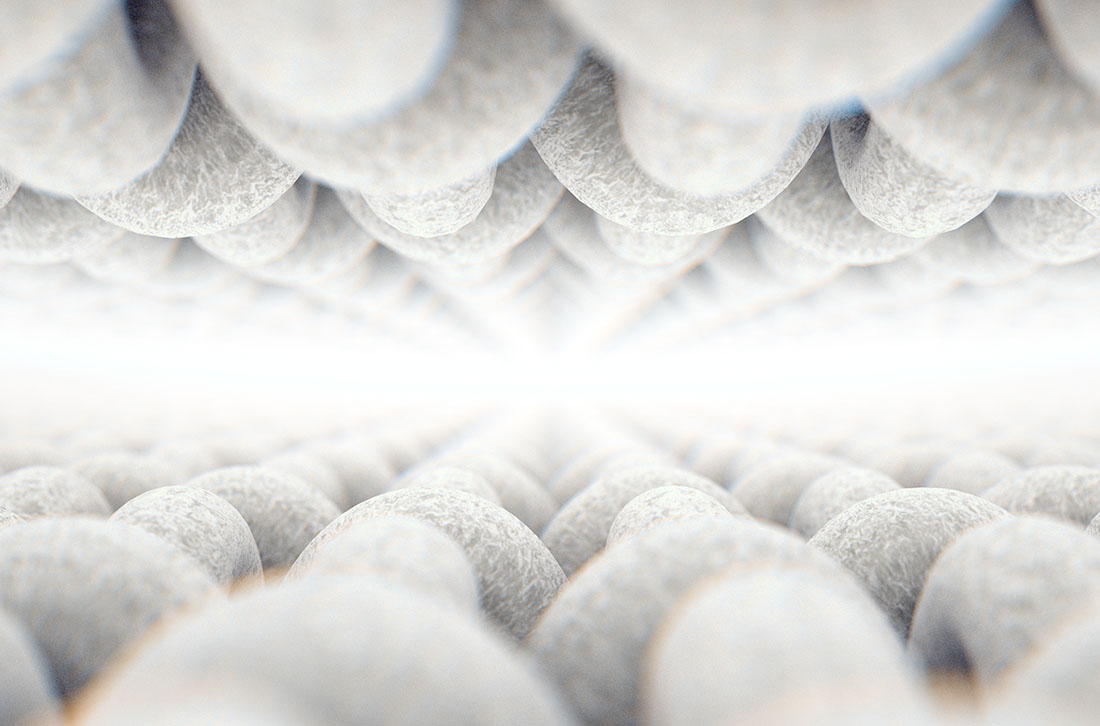In the dynamic and global textile fiber industry with its various manufacturing processes and end-uses, news and information is breaking on a daily basis. International Fiber Journal is tracking stories relevant to our industry from manmade to natural to bio-based fibers, innovations in nonwoven, woven, braided and technical textiles, technologies for additives, bonding, coatings and polymers, and applications from apparel to hygiene to transportation, and more. Here we will post news stories relevant to textile fibers and their downstream applications on an ongoing basis. Please check back for regular updates. If you have news that you feel should be added to this summary report, please email it to Matt Migliore at mmigliore@inda.media.
Most recent update: October 31, 2020
David Zarrilli named Director of Global Sales & Marketing for Thwing-Albert Instrument Company
Thwing-Albert Instrument Company announced David Zarrilli will be assuming the role of Director of Global Sales and Marketing. As David has been with Thwing-Albert for nearly 30 years, having spent most of that time in various sales and marketing positions, he brings a solid foundation and understanding of materials testing and the instrumentation required to meet the demands of today’s vigorous testing needs. For the past 10 years, he was a regional account manager responsible for direct interaction with clients to identify and provide testing instrumentation that was optimized for their specific testing needs.

Director of Sales
Thwing-Albert Instrument Co.
Source: thwingalbert.com
Fibre Extrusion Technology announces new orders for projects focused on sustainable material development
Fibre Extrusion Technology Limited (FET) of Leeds, England, announces new orders for melt spinning extrusion lines for sustainable fiber and materials development. With over 50 such pilot and laboratory extrusion lines already out and operating successfully in the field, FET currently has orders for eight additional systems and is currently engaged at the development stage with numerous other clients on sustainable projects.
The growing trend towards global sustainability has been embraced by textile and yarn manufacturers and FET is positioning to assist in developing polymers made from renewable resources, which it views as a viable alternative to fossil fuels, either bio-based (produced from biomass feedstocks such as starch and cellulose) or recycled polymers which repurpose existing materials.
FET has considerable experience in sustainable fibre development across a broad spectrum of industries. These include Medical (resorbables, PPE, face masks, gowns and bandages), Textiles (flooring, bedding, clothing, footwear and sportswear), Manufacturing (3D printing, automotive, composites and filtration), Consumables (coffee filters and tea bags) and Agriculture (tying twines and strimmer lines).
The company has successfully processed almost 30 different polymer types in multifilament, monofilament and non-woven formats. The in-house Process Development Laboratory enables client testing and evaluation throughout the experimental and development phases of every project.
Source: fetuk.com
INDA issues official statement on plastics in the environment
INDA, Association of the Nonwoven Fabrics Industry, issued a position statement on the issue of plastic in the environment. The statement covers the “Definition of Plastics,” “Applicability of Plastics Legislation,” “Responsibly Sourced Plastics,” and “Responsible End-of-Life Plastics.”
In the introduction of its statement, INDA noted: “While every company has its own position and interests regarding this issue, the attached Position Statement can be helpful in framing the issue and discussing with local policy makers what our industry is doing and thinking about the use of plastics in nonwovens. The key point of the attached is that, in our highly innovative industry, material science developments that deliver desired performance, either in their sourcing or their end-of-life behavior, should not be subjected to remedies intended for plastic materials that do not have desired performance in those areas. Policy makers who jump to material prescriptive approaches could pre-empt the use of materials that do exactly what they want materials to do, but because they fit a certain definition of ‘plastic’ can be banned or subjected to fines or levies.”
Read INDA’s position statement: https://www.inda.org/wp-content/uploads/2020/10/INDA-Position-Statement-on-Plastics.pdf
Source: inda.org
* International Fiber Journal is owned by INDA, Association of the Nonwoven Fabrics Industry (inda.org).
RGE issues report outlining plans for $200M investment in textile fiber innovation
RGE has released a 2019-2020 progress report on its commitment to invest US $200 million in next-generation textile fiber innovation and technology over a 10-year period. The inaugural report is released a week ahead of the annual Textile Exchange Sustainability Conference where RGE announced its commitment a year ago.
The 28-page report provides a summary of the activities undertaken by RGE’s business groups involved in the fashion value chain to advance its ambition towards closed loop, circular and climate-positive cellulosic fiber.
Bey Soo Khiang, Vice Chairman, RGE said, “We pride ourselves on the fact that the virgin resources we draw on to make a range of daily essential products are renewable. But this does not mean that we rest on our laurels. In fact, we are taking our sustainability commitment to the next level by exploring how waste can also be used as a resource to regenerate new materials and give rise to a truly circular economy.”
The target allocation for the investment is set at 70% in scaling up proven clean technology in fiber manufacturing, 20% in bringing pilot scale production to commercial scale, and 10 per cent in R&D in emerging frontier solutions.
RGE has adopted a three-pronged approach to its investments: sourcing ready solutions in the market, investing in start-ups, and strengthening its in-house R&D capabilities.
In the past 12 months, notable achievements included the launch of FINEX™, a Recycled Claim Standard (RCS)-certified fibe containing up to 20% recycled content produced using a 35,000 ton per annum commercial line, inaugural production of Lyocell, a closed-loop fiber that uses minimal chemical and a solvent that is nearly fully recoverable and recycled, as well as new R&D facilities in China and Indonesia. It also initiated an in-house cotton textile waste recycling project.
Download full progress report.
Source: rgei.com
Zund names Bill Richards Sales Director for U.S., Canada & Carribean
Zund America announced the recent appointment of Bill Richards to the position of Sales Director, responsible for the U.S, Canada, and Caribbean. Bill comes to Zund America with more than 20 years of sales and sales management experience in manufacturing workflows, digital cutting, software design, and enterprise solutions. Six years at Gerber Technology as Director of Sales for Digital Finishing Solutions and nearly two years with EFI Optitex as Sales Manager for Americas Enterprise Business are among the many highlights of Bill’s 15-year involvement in sales and management roles in the apparel manufacturing and decorating industry assisting companies of all sizes.

Zund
Sales Director, U.S., Canada, Carribean
Based in the Oak Creek corporate office, Bill will be managing Zund America’s inside, outside, and strategic account sales teams with focus on driving both direct and channel sales in the graphics and packaging segments as well as continuing to grow Zünd market share in industrial applications including textile/tech textile, leather, and composites.
Source: zund.com
Elevate Textiles issues 2020 Sustainability Report, noting progress toward UN Global Compact goals
Elevate Textiles released its 2020 Sustainability Report. Elevate Textiles offers distinguished global textile brands including American & Efird (A&E), Burlington, Cone Denim, Gütermann and Safety Components. The report serves as the first corporate report for Elevate and the 10th annual report to include the A&E brand.
Within the report, Elevate outlines progress towards its 2025 Sustainability Goals, focused on sustainably sourced fibers, reduced water consumption and reduction in greenhouse gases. As Elevate’s first annual Communication on Progress for the UN Global Compact and CEO Water Mandate, 2020’s report shares the company’s performance against goals outlined within its environmental program, the Ten Threads of Sustainability.
“Our brands share a long-standing commitment to sustainability and a drive to accelerate our efforts to new heights,” said Sim Skinner, President and Chief Executive Officer of Elevate Textiles. “Elevate teams around the globe work every day to create and distribute premium, ethically and sustainably sourced products through excellence in innovation and responsible manufacturing practices. We are pleased to present Elevate’s first Sustainability Report and look forward to sharing our continued progress in our journey to lead meaningful change.”
Elevate achievements outlined in the report include:
- 7.7% reduction of absolute greenhouse gas from 2016 to 2019, meeting the corporate goal of 2.5% per year reduction
- 7.5% reduction of absolute global water consumption since 2016
- Increased water recycling by 65% since 2016 by implementing new wastewater technologies
- Achieved 52% sustainably sourced cotton against its goal of 80% sustainably sourced by 2025
To view the full report: https://www.elevatetextiles.com/home/sustainability/
Source: elevatetextiles.com
Avgol shifts nonwoven production capacity to India, as it increases emphasis on hygiene products in the region
Avgol, a manufacturer of high-performance nonwoven fabric solutions, has confirmed it is relocating an existing asset to India as part of an immediate strategic investment in the region. Relocation of the Avgol Line 5 production from Barkan, Israel, to India is underway now, with installation expected to be completed by end of 2021.
Mr Rachim said that the investment in new production capacity would also support further product development from Avgol, under its innovative Forward Innovative Thinking strategy (FITTM). The research and development program creates value, flexibility and sustainability for brands and manufacturers from the outset.
Shachar Rachim, CEO at Avgol, said that this move is part of the company’s commitment to continue increasing its presence and service across India and South Asia.
“There is a huge domestic demand for hygiene products in India and across the South East Asia region, but there are heavy tariffs on importing materials,” said Rachim. “The demand is already at 165% against local supply capacity. Our projections show that through regional organic growth, improved promotion of feminine health, and increased awareness of hygiene because of the coronavirus pandemic, demand is only going to increase.”
Avgol, an Indorama Ventures Limited company, serves the global hygiene market with the most comprehensive range of ultra-lightweight spun-melt nonwoven fabrics.
Source: avgol.com
Asia Pacific Rayon updates its ‘Follow Our Fibre’ blockchain technology
Asia Pacific Rayon’s (APR) “Follow Our Fibre” technology is a blockchain-based tool that allows users access to information in real-time on the source of the raw materials in their garments and the origination of the fibre.
Launched in May 2019, the platform has been refreshed to include information of its suppliers’ conservation and biodiversity efforts, taking information transparency and richness to a new level.
The refresh comes at a time when the fashion industry, through the Fashion Pact, is beginning to embrace biodiversity as a core focus on its agenda.
Follow Our Fibre now maps APR’s supply chain right down to locations of forest plantation concessions and conservation areas. The textile fiber producer’s suppliers are collectively responsible for the conservation of more than 3.12 million hectares of forests around the world, including boreal and peat swamp forests. These protected forests have rich biodiversity like the elusive Sumatran Tiger and Canadian Boreal Caribou, and provide ecosystem services, including 22 rivers and tributaries totalling over 900km.
“It is vital that we work with our supply partners to protect and strengthen forest landscape conservation areas rich in flora and fauna, and home to threatened and endangered species for today and future generations. These efforts are part of APR’s commitment to the United Nations Sustainable Development Goals (UNSDGs) 13 on Climate Action, and 15 on Life on Land,” said Cherie
Tan, Vice President of Sustainability and Communications.
By providing a snapshot of the forest landscapes and biodiversity, APR hopes to quantify its ecological footprint and, as a next step, seek opportunities to partner its stakeholders to further strengthen forest conservation and enhance biodiversity in areas it sources from.
Follow Our Fibre reflects the company’s long-term objectives for sustainable pulp sourcing and responsible manufacturing, and is a tool for its customers and stakeholders to trace finished products back to forest plantation origins, as well as monitor the environmental performance of APR’s supply chain.
Source: https://www.aprayon.com/
ADM, Spiber partner on sustainable polymer production
ADM and Spiber Inc. (Spiber) today announced an agreement to expand the production of Spiber’s innovative Brewed Protein™ polymers for use in apparel and other consumer products. The collaboration will combine Spiber’s cutting-edge structural protein fermentation technology with ADM’s deep expertise in large-scale fermentation technologies, engineering, operations and extensive agricultural supply chain.
The Brewed Protein polymers will be produced by ADM in the U.S. using plant-based dextrose as a feedstock, and then shipped to Spiber downstream facilities, where they will be processed into an array of materials — primarily fibers — for use in a variety of applications such as apparel, lightweight auto parts, high-performance foams, and more. Brewed Protein polymers will play a critical role in expanding the range of plant-based, sustainable alternative materials.
Source: spiber.jp
World Congress on Textile Coating announces all-virtual program
Given the likelihood that restrictions on travel and meetings will remain in force over the next few months, we have decided to make the World Congress on Textile Coating an online event. Importantly, this will guarantee we can keep the meeting truly global, despite the current pandemic.
WCTC is run by the organizers of the successful and long-running conference series Textile Coating and Laminating (TCL).
WCTC has expanded and refocused this event, and the conference presentations will take place over four sessions: 11-12 February 2021 for sessions 1 & 2, and 18-19 February 2021 for sessions 3 & 4, all commencing at 12:00pm GMT.
SESSION TITLES:
Session One:
Industry and market trends
Novel applications for coated and laminated textiles
Session Two:
Machinery, equipment and processes for coating and laminating
Session Three:
Coatings and laminate materials
Session Four:
Environmental issues
Each session will be followed by live face-to-face Q&A with the speakers, moderated by the chair, industry specialist Adrian Wilson. Participants will have the opportunity to put their questions and comments to the panel of experts in the same way that they would during a live conference.
There will be the same valuable networking opportunities with fellow delegates and speakers. This along with the quality of the program and presentations from invited industry experts will give participants the same level of event that you have come to expect from our conferences. The entire conference will be recorded and available for download post-event, including the Q&A forums.
For more info and to register: https://www.technical-textiles.online/WCTC.
WPT Nonwovens to host job fair to fill 60 available positions at its facility in Beaver Dam, Kentucky
Having experienced strong growth since the opening of a new facility in Beaver Dam, Kentucky in 2018, WPT Nonwovens is planning a job fair to recruit for 60 new positions. The job fair will be presented on Thursday, November 5th, 7:00 am – 10 am and 3:00 pm – 7:00 pm at WPT Nonwovens’ North Plant, 985 W 7th Ave., Beaver Dam, KY
Open positions include Machine Operators, Forklift Operators, Electrical Maintenance, and Mechanical Maintenance.
WPT Nonwovens is a family owned company, headed by military vetern, Travis Robbins. Serving global markets in the medical, filtration, hygiene, and industrial sectors since 2008, the company provides high quality, affordable products that fit the needs of small order customers and large multinational corporations alike. WPT Nonwovens’ original plant was constructed in early 1970s, and the company has continued to grow into a thriving business and member of the Beaver Dam community.
Source: wptnonwovens.com
LYCRA to showcase Anti-Slip Fiber for denim fabrics at Kingpins24-Amsterdam
The LYCRA Company will debut its newest denim innovation, LYCRA Anti-Slip Fiber, this month during the Kingpins24-Amsterdam online event. Each day of the virtual expo will explore a different theme impacting the global denim industry – Inspiration (Oct. 27), Innovation (Oct. 28), Fibers and Raw Materials (Oct. 29) and People and Social (Oct. 30) – via live-streamed and on-demand panels, seminars and interviews. Kingpins is transitioning its denim tradeshow for the third time to an online format amid COVID-19 concerns. Previous events in April and September drew more than 4,000 live stream viewers and more than 38,000 on-demand content views.
Leaders from The LYCRA Company will play key roles in the agenda. On Oct. 28, newly appointed Chief Innovation Officer Steve Stewart will discuss the company’s innovation process. More than 100 PhDs at the company’s four state-of-the-art R&D labs are dedicated to developing innovative fiber, fabric and garment solutions for the apparel industry.
“Our innovation strategy identifies the stated and unstated needs of our consumers and customers, and is guided by proprietary research, trends and insights,” Stewart said. “We specifically look for pain points that can be solved with new or improved products or processes that add value. Our stretch technologies have revolutionized the textile and apparel industry and we continue to challenge ourselves to drive further product differentiation that helps to redefine the markets we compete in.”
Stewart will present LYCRA Anti-Slip fiber, a new denim seam slippage solution for applications in single-core spandex fabrics that require durable stretch and good recovery power. This patent-pending fiber helps maintain garment appearance wash after wash and wear after wear.
Source: thelycracompany.com
Procter & Gamble, Oerlikon Nonwoven ink licensing agreement around Phantom hybrid substrate technology
Procter & Gamble and Oerlikon Nonwoven – Teknoweb Materials have agreed to an exclusive license agreement to market and sell the Phantom platform worldwide. The patented process for hybrid nonwovens combines both airlaid and spunmelt technologies to deliver new, flexible ways of creating wet and dry wipes. Phantom technology offers additional benefits by reducing resources and cost, while increasing overall performance. The exclusive license gives Oerlikon Nonwoven – Teknoweb Materials distribute this technology worldwide. In addition, Oerlikon Nonwoven – Teknoweb Materials have further refined the process into their own Levra technology – an entry-level option which offers tailored production volumes with lower investment costs but is still suitable to be upgraded to the premium Phantom model in the future.
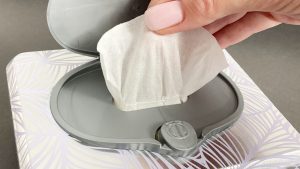
Essentially, Phantom technology was developed to produce hybrid substrates. The spunmelt and airlaid processes are merged into one step to combine cellulose fibers, long fibers such as cotton, or even powders with polymer fibers in unprecedented ways. This technology has clear advantages in terms of resources, performance, and cost compared to the previous processes on the market. By removing hydroentanglement, it is no longer necessary to dry the material. Adjusting the process can optimize relevant product characteristics such as softness, strength, dirt absorption, and liquid absorption. In the end, this even increases the quality of the product itself.
The greater freedom for formulating continuous and discrete fibers allows for more flexible and absorbent structures and highly textured materials. Wipes feel softer to the touch while providing more protection for the hands. Up to 90% of the material can consist of pulp fibers, although natural alternatives like cotton or synthetic fibers can be added to the mix.
Phantom technology has not only found a practical application in a variety of wipes – such as hygiene wipes, anti-bacterial wipes, surgical wipes, or industrial wipes – but also in absorbent cores, for instance indiapers or fempro products. With so many applications, Oerlikon Nonwoven – Teknoweb Materials are fully prepared to deliver Procter & Gamble’s innovative Phantom technology to the global nonwovens market.
Source: oerlikon.com/manmade-fibers
Monforts presents webinar for technical textile companies in India; survey reveals important market dynamics
Over 250 textile specialists attended Coating Solutions and Further Profitable Alternatives, a webinar by Monforts held on October 21 specifically for companies in India.
And in a poll during the event, 69% of those taking part revealed that their companies were actively exploring the possibility of entering the field of the coating and finishing of technical textiles within the next 12 months.
The response is likely aligned with India’s response to the global shortages of facemasks and other PPE items, which has alerted many to what is just a part of the vast technical textiles market, but Gurudas Aras, director of the Textile Engineering Group of ATE, the representative for Monforts in India, provided a few more reasons why it is now so attractive.
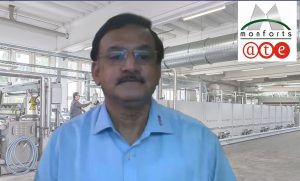
The global market for technical textiles was estimated to be worth $194 billion in 2019, and to grow to $250 billion by 2027. India’s share of this market in 2019 was just $19 billion, and the nation remains dependent on imported materials for medical implants, sanitary protection, protective materials and much more.
Over 41% of India’s technical textile production is still in the relatively low-profit area of materials for packaging, but much bigger opportunities are to be found in areas such as transportation (Mobiltech), sportswear (Sportech) and construction (Buildtech).
Meanwhile, India’s population currently consumes just 1.7kg of technical textiles per capita, compared to 10-12kg in the countries where the markets are the most developed.
Under the National Technical Textiles Mission, the country’s government plans to build India’s market to a value of $40 billion as early as 2024, via a package of investment-friendly incentives for both domestic players and foreign investors.
Textile technologist Jonas Beisel stressed that despite any current travel restrictions, the Monforts Advanced Technology Centre (ATC) is fully operational for industrial-scale trials which go beyond lab or pilot plant testing, to be run by highly experienced staff on behalf of customers.
Since its opening in 2013, over €3 million has been invested in equipment at the Monforts ATC, which over an area of 1,200 square metres, houses two full finishing lines, engineered to accommodate an extremely diverse range of processes and based around the industry-leading Montex stenter including high temperature and split temperature fabric treatment, in addition to a Thermex range for the continuous dyeing and the newly developed process of yarn dyeing.
Source: monforts.de
SAYA debuts textile scrap to performance fiber recycling capability at Taipei Innovative Textile Application Show
SAYA, a new name in recycled fiber, made its live debut at the Taipei Innovative Textile Application Show (TITASic). This year’s TITAS showcased sustainable textiles, which reduce resource usage and optimize manufacturing efficiency by adopting eco-friendly materials and processes. SAYA’s Rscuw, fibers made of recycled cutting scrap and overstock yardage, was featured at the show in the brand’s film (SAYA Rscuw launch video), which depicts the motivation behind finding new sources of materials to be recycled and the process developed by SAYA engineers.
SAYA Rscuw is recycled polyester fiber from cutting scrap that is bleached and dyeable to whatever vibrant color the brand chooses. It is available in ultrafine microfiber filaments and can be enhanced with performance applications such as stretch, color protection, quick-dry, or anti-bacterial.
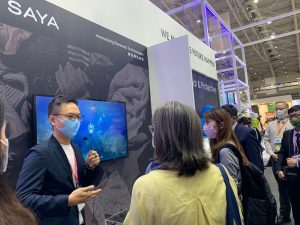
At this time SAYA Rscuw is limited to 100% polyester fabric cutting scraps without coating nor finishes. Continued research is increasing the percentage of overstock waste and types of coatings and finishings for a more inclusive solution.
SAYA also offers Rscuw Raw, which is mechanically recycled cutting scrap and yardage without the chemical treatment. The resulting fiber retains a tint of original yardage color which shows up in knit or woven fabric as a unique heathered effect in shades from grey to copper. Without the bleaching and redyeing, the process to manufacture Rscuw Raw is more energy efficient and the carbon footprint is further reduced.
Source: SAYArenew.com
Matthew Tipper named CEO of Nonwovens Innovation Research Institute
Matthew Tipper, Ph.D., was named CEO of the Nonwovens Innovation Research Institute (NIRI). Dr. Tipper has been with NIRI since 2005 and previously held positions of Operations Director and Business Director. He’s a Ph.D. level Textile Engineer, who prior to NIRI worked for several leading nonwoven producers in manufacturing and technical roles supplying multiple markets including healthcare, medical, wipes, automotive and filtration. Since joining NIRI, he has helped deliver over 550 projects for over 220 companies worldwide. Combining high-level technical skills and commercial acumen, he has helped NIRI grow into a thriving organization with a reputation for accelerating innovation and developing commercially viable products.
“I am delighted to be appointed as CEO and look forward to helping our customers grow their businesses – that way our business will grow,” said Dr. Tipper.
Source: http://www.nonwovens-innovation.com/
Arris Composites wins prestigious Red Dot award for innovation around additive carbon fiber composite technology
Arris Composites, a developer of next-generation composites, announced its Additive Molding Carbon Fiber Truss won the “Red Dot: Design Concept 2020” award. Arris’ carbon fiber truss doubles the specific stiffness of a steel I-beam while adding material benefits like corrosion resistance and the opportunity for functional integration into the structure. It is also 100 percent recyclable and highly scalable in size and quantity thanks to Arris’ innovative Additive Molding manufacturing process.
Arris’ process combines additive manufacturing and traditional high-volume molding techniques to produce continuous carbon fiber composites that can be combined with other materials, such as metals and even electronics.
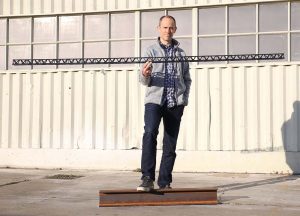
“Carbon fiber is one of the highest performance materials available, but high-cost manufacturing processes have kept it exclusive to extreme performance applications, like aircraft and premium automobiles,” explains Ethan Escowitz, CEO and founder of Arris Composites. “Our truss shows how the Additive Molding process can deliver optimized composites at mass-production volumes and costs for applications across industries as diverse as consumer electronics and sporting goods, to aerospace and automotive. It’s an honor to have it recognized by Red Dot.”
Source: arriscomposites.com
Textile chemistry companies form collaborative focused on sustainability
Seven of the world’s leading chemical companies have come together to launch Sustainable Chemistry for the Textile Industry (SCTI). With a commitment to collaboration, innovation and transformational change, the new alliance aims to lead the textile and leather industries towards a more sustainable future.
“As the global textile and leather industries strive to become more sustainable, chemistry solutions have a defining role to play. Sustainable chemistry enables brands, retailers and manufacturers to better protect the well-being of factory workers, local communities, the environment and, ultimately, consumers,” said Rohit Aggarwal, SCTI Chairman and President of Huntsman Textile Effects. “But while meaningful improvements are possible, no one company can achieve the shift to sustainability on its own. This is the impetus for SCTI.”
All of the founding members of SCTI – Archroma, CHT Group, Huntsman, Kyung-In Synthetic Corporation (KISCO), Pulcra Chemicals, Rudolf Group and Tanatex Chemicals – are now committing to investing and working together to further advance chemistry knowledge and its safe and sustainable application in the textile and leather industries.
Specifically, SCTI will support brands, retailers and manufacturers of all sizes at every stage in their sustainability journey to achieve the highest levels of sustainability, by sharing members’ knowledge of chemistry and its application, and by providing training and tools to ensure stakeholders can adopt technologies and optimize processes. SCTI is also developing a global harmonized sustainability standard for chemical products used in the industry, along with a supporting assessment tool that covers all aspects of the products, from hazards through to environmental, ecological and social impacts.
Source: scti.org
Kraig Labs completes genetic screening of silkworm eggs to restart production
Kraig Biocraft Laboratories, Inc., has completed production and genetic screening of its latest batch of spider silk silkworm eggs. These specialized silkworm eggs are now ready for shipment to Vietnam to restart commercial production.
Production operations at the company’s factory were suspended in March due to a mandatory shutdown, resulting from the global spread of COVID-19. During the COVID-19 quarantine, Kraig Labs’ U.S.-based team focused its efforts on improving the performance and genetics of its Dragon Silk strain of recombinant spider silk silkworms. Kraig Labs’ U.S. operations also used this time to scale up its supply of silkworm eggs to allow for a restart of its operations in Vietnam.
Source: kraiglabs.com
Berry Global adds second Reicofil R5 line to meet capacity demands for healthcare materials in Asia
Berry Global Group, Inc. announced it is investing in a Reicofil R5 asset to provide incremental capacity to serve the fast-growing Asia healthcare markets. The investment is targeted to meet forecasted market and customer growth and will be focused on high performance applications in the desired healthcare markets. The nonwovens investment supports Berry’s strategy to further its leadership position in healthcare. Once installed, the asset will be critical in the manufacturing of healthcare nonwoven materials, primarily surgical drapes and gowns.
The new asset will be installed at Berry’s Nanhai, China, facility, which is strategically positioned to serve customers in the rapidly growing Southeast Asia region. Current projections are for startup in the September quarter of 2022.
“We are committed to further partnering with our customers to pursue growth opportunities around the world. The added capacity achieved through this asset is a next step in advancing our market leading position in healthcare material solutions,” said Curt Begle, President of Berry’s Health, Hygiene, and Specialties Division. “This investment comes on the heels of the successful commercialization of the first of its kind R5 asset in Berry’s Nanhai, China, facility, serving the high-loft soft material needs of the premium hygiene markets throughout the Asia region.”
Berry will be the first company in the world to secure two R5 assets.
Source: berryglobal.com
General Recycled nears completion of recycling facility focused on processing aramid materials for reuse
General Recycled announced it is nearing completion of construction and installation of a new textile recycling facility in Asbestos, Quebec, which will be focused on recycling of industrial work-wear, including aramid materials.
“We started General Recycled in 2012, hoping that we would be in a position to build a new recycling facility in Quebec, close to our value chain of suppliers,” said Ted Parker, CEO of General Recycled. “I am pleased to say that our plans to complete construction of our new facility for mid October 2020 are on target. Following building completion, we can then move to installation of the new recycling equipment. Our goal is to be fully operational by the end of February 2021.”
General Recycled, which specializes in recycling fabrics, continues to develop processes that uphold sustainability principles. Aromatic polyamide (Aramid) fiber and fabrics are used extensively in fire-resistant garments Nomex, Kevlar, Conex, Kermel, for example, feature a very strong fiber, which is important to industrial work-wear. Aramid fabrics, however, are 100% nonbiodegradable, which is why recycling in important.
General Recycled works with companies to properly dispose of their non-biodegradable garments by returning them back into a usable fiber, yarn, and fabrics that meet all applicable
industry standards.
“Most companies today have excellent sustainability messaging on their website. However, for those companies using garments made with aramid fabric, they always neglect to add that they allow their non-biodegradable garments to be put in the garbage. Many companies are not aware they have a problem, and we will gladly help educate them. There is no longer any reason for
aramid garments and fabric to be disposed of in landfill,” said Parker. “We have created a truly closed-loop program when it comes to the use and re-use of aramids.”
Source: generalrecycled.com
EDANA presents first edition of Circular Nonwovens Forum
With over 100 delegates from across the nonwovens and related industries in attendance, the first edition of EDANA’s new Circular Nonwovens Forum was presented this week in a virtual format.
The forum opened with a keynote speech from Paola Migliorini, the Deputy Head of Unit for Sustainable Production, Products & Consumption on the European Commission’s new Circular Economy Action Plan. It was followed by a range of presentations and discussions covering initiatives to address the circularity of AHP plastic waste, the biodegradability and compostability of nonwovens, material innovations, and developments in renewable polypropylene. The presentations were followed by breakout sessions, allowing for participants to engage with the speakers.
“There is clear awareness and engagement about the sustainability of products in the nonwovens sector” said Pierre Wiertz, General Manager of EDANA. “And circularity is one of the most complex pillars of sustainability strategies, so it is very important that, as the voice of our industry, EDANA facilitates industry interaction and knowledge sharing with forums such as these. I am happy to see this sentiment supported with the level of attendance and engagement we had at the forum.”
The Circular Nonwovens Forum is planned to be held annually with the next edition scheduled to be in Brussels in September 2021.
View the full program at https://www.edana.org/docs/default-source/events-documents/cnf20-programme-final.pdf
Source: edana.org
FET strengthens collaboration with Senbis, providing fiber extrusion lines in support of sustainability initiative
Fibre Extrusion Technology Limited of Leeds, England, has further developed its association with technological company Senbis Polymer Innovations of the Netherlands. The partnership revolves around sustainability through technological innovation and collaboration on a variety of projects.
FET has long been at the cutting edge in new applications and process development for melt spinning fiber extrusion and will design and provide pilot extrusion lines to Senbis for the production of technical yarns and textile fibers.
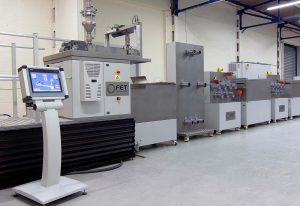
Senbis Polymer Innovations divides its activities between R&D services and the production of sustainable polymeric products. The company is investing 5.5 million euros over the next three years in a testing facility for development of sustainable plastics at different scales ranging from laboratory to production. This will facilitate the acceleration and upscaling of future developments relating to sustainable plastics.
FET will provide two extrusion lines in separate phases in 2020-21. A monofilament line, including water baths, drawing frames, ovens, dimension sensor, monofilament winders and dedicated control panel. This will be followed by a multifilament line, including the extruder set-up and the multifilament drawing and winding frame with control panel.
The new extruders and spinning machines will furthermore enable Senbis to manufacture bicomponent yarns. Another area of potential is the development of filaments and powders for 3D printing.
Source: fetuk.com
Italian textile machinery companies to participate in Innovate Textile & Apparel virtual trade show
As a result of the cancellation of key industry in-person exhibitions dedicated to the textile machinery, the Italian Trade Agency and ACIMIT, the Association of Italian Textile
Machinery Manufacturers, are digitally attending Innovate Textile & Apparel, a virtual trade show for the textile sector. Innovate Textile & Apparel will be live on 15-30 October 2020 and will be supported by more than 100 textile industry organizations and associations around the world.
The Italian presence at Innovate Textile & Apparel is organized through a Digital Pavilion, where 21 Italian machinery manufacturers involved in the production of machines for technical textiles will show their innovative solutions. Collectively, they will exhibit a wide range of advanced technologies, products and services, able to meet the highest customers’ requirements, even tailor-made. From printing and dyeing machines to woven and non-woven solutions systems but also radio frequency dryers, twisting and covering machines and much more.
These are the companies showcasing at Innovate Textile & Apparel: A.Piovan, Dell’orco & Villani, Drm, Efi Reggiani, Erhardt+Leimer, Ferraro, Guarneri Technology, I.C.S. Italian Color Solution, Lawer, Loptex, Macchine Caru’, Matex, Mcs Officina Meccanica, Mesdan, Monti Antonio, Officina Master Di Livi Raffaello, Ramallumin, Ratti Luino, Stalam, Tonello, Unitech Industries.
For more information about the Innovate Textile & Apparel virtual trade show, visit vts.wtin.com.
Source: acimit.it & itahouston.com
Lee Bassett, founder & chairman of Fi-Tech, Inc., passes away at age 82
C. L. (“Lee”) Bassett, Founder & Chairman of the manufacturers representative and distribution firm, Fi-Tech, Inc. (“Fi-Tech”), passed away peacefully on October 5, 2020. The news was announced by his sons Jeffrey Bassett and Todd Bassett, who have operated the firm as managing directors since 2012.
Lee was born in Prospect Park, Pennsylvania, in 1938 and later graduated from Duke University with a degree in Mechanical Engineering. After earning an MBA from the University of North Carolina, he began his career in manufacturing in Richmond, Virginia. In February 1972, with his wife Becky and three young children, Lee left a stable job and started Fi-Tech.
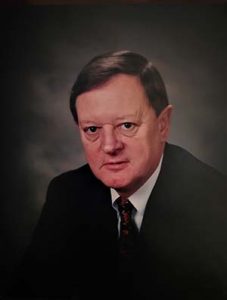
Founder & Chairman, Fi-Tech, Inc.
1938-2020
Lee launched Fi-Tech as a manufacturers representative firm for the synthetic fibers industry and transformed it into a global business, serving as a connection to the most advanced suppliers in the polymer, synthetic fibers, nonwovens, textile, converting, perforating, and tobacco industries. Lee was revered for his commitment to building lasting relationships, a company attribute imbued by its founder.
In the 40 years prior to his retirement in 2012, Lee cultivated partnerships with nearly 50 principals across multiple countries. Fi-Tech also opened its office in San Luis Potosí, Mexico in 1995, and later purchased its principal, Arkote, Ltd. in Sheffield, England. Throughout his years, Lee travelled extensively worldwide for both business and pleasure.
“Our father possessed the unique combination of an incredible intellect and attention to detail, as well as the important relational skills needed to be a successful businessman. He enjoyed and took great pride in building the long-term relationships based on mutual trust that are so important to our business,” stated Jeffrey and Todd Bassett, Managing Directors, Fi-Tech.
Lee brought his three children into the company to add to Fi-Tech’s continued success. Jeffrey and Todd assumed leadership as Managing Directors in 2012, while his daughter, Julie Thompson, sits on the company’s Board of Directors.
Source: fi-tech.com
SAYA debuts with a focus on enhanced textile recycling
SAYA, a new name in fiber announces its debut with an expanded offering beyond recycled PET bottles including recycled cutting scrap and fabric, bringing new options to the textile industry. Nan Ya Plastics, SAYA’s parent company, is the world’s largest manufacturer of recycled PET, repurposing over 75 billion bottles every year. Now under the brand SAYA, research and development efforts continue to focus on the critical recycling and sustainability issues that face the textile and garment industry and redefine what’s possible in renewal.
SAYA 365 continues to expand and refine the recycling of PET throughout the world. A proprietary, five-stage filtration process followed by two stages of purification result in batch optimized flakes and pellets ready to be transformed into performance fibers. The result is the SAYA renewed difference, with better tenacity strength, dyeing accuracy, and brighter whites compared to conventional recycled fibers.
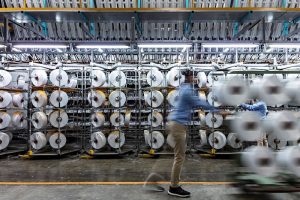
- SAYA 365 – Plastic bottles sourced from Asia and beyond. Providing consistent and cost-effective supply for sustainable options in polyester fiber.
- SAYA Coastal – This specialized recycling program targets clean-up and renewal of discarded plastic bottles in coastal regions that would otherwise migrate out to sea (80% of ocean plastics originate from coastal land).
- SAYA USA – Recycled polyester fibers made in our facility in Lake City, South Carolina, USA, receive this unique designation. Options include using locally or internationally recycled bottles and waste for those looking for a USA-based fiber program with full traceability and transparency.
SAYA Next seeks to innovate and provide solutions for the industrial waste problem shrouding the textile industry, including scrap, cutting waste, overstock fabric and soon, used garments. The unique programs within SAYA Next include:
- SAYA RSCUW – Currently available, SAYA RSCUW reduces waste by 30% per yard by recycling cutting scraps and overstock rolls of fabric, which has historically ended up in landfills or is stored indefinitely in warehouses.
- SAYA RSCUW RAW – Currently available, SAYA RSCUW RAW is made from recycled fabric cutting scrap and colored PET bottles retaining their original color. Without the bleaching and re-dying process, this effort is more energy efficient and the carbon footprint is further reduced. The resulting knit or woven fabric has a unique heathered effect in shades from grey to nearly black.
- SAYA Garma – Currently in development. SAYA Garma will be available in late 2021. This complex recycling process of used post-consumer garments will streamline the garment recycling by offering turnkey retail to fiber solutions to select brand partners. Contact SAYA for more details.
Source: sayarenew.com
EDANA announces 2020 INDEX Innovation Award winners
Held every three years to acknowledge excellence in the nonwovens and related industries, EDANA’s INDEX Innovation Awards program was presented in virtual form this year. The ceremony was originally programmed to take place during the INDEX 20 exhibition in April, which has been rescheduled for the 7–10 September 2021 due to the COVID-19 pandemic. A live online ceremony was held on 6 October to recognize INDEX Innovation Award winners.

With over 70 project submissions across 7 categories covering the entire nonwovens supply chain, the awards judging panel, composed of senior industry representatives, members of the nonwovens press, and EDANA officers, had the difficult task of refined the list to three nominees per category.
- Nonwoven Roll GoodsJacob Holm – Sontara® Dual: Sontara® Dual is a unique, new 100% cellulosic wipe substrate made with proprietary Sontara® technology. The material combines a rough side with a soft side to achieve extraordinary cleaning results. The unique 3D-aperture structure protects delicate surfaces from scratches and is gentle enough to use on skin. Sontara® Dual is available in various colours and is free from any binders, chemicals or adhesives.
- Finished products made from, or incorporating nonwovensDupont De Nemours – Tychem® 2000 SFR: Tychem® 2000 SFR represents a new generation of secondary flame-resistant chemical garment technology, specially designed to meet the dual hazard needs of a protective chemical suit against chemical splashes together with secondary flame-resistance. The fabric used in Tychem® 2000 SFR garments is a unique technology. It does not char when exposed to flames, but was designed to shrink away from flames -without burning.
- Raw materials or components (e.g. fibre, binder, polymer, tape), of special relevance to the nonwovens industry and related converted productsBeaulieu Fibres International – UltraBond: Producing 100% recyclable sustainable needle-punched fabrics with this unique polyolefin staple fibre. UltraBond eliminates the need for latex or other chemical binders to consolidate nonwovens. The innovation opens up a new path to create 100% PP needlepunched fabrics which meet the same performance requirements, whilst reducing the end-of-life environmental impact.
- Innovation in machinery of special relevance to the nonwovens industryGDM – Expandable Welding Wheel: This innovative solution generates a side seam welding in baby and adult pant-type products. This technology enables the production of an extended number of sizes with the same unit. Side-seam bonding and performance are guaranteed for a wide range of raw materials. The unit is composed of welding stations mounted onto a wheel-like system, allowing high-speed operation and requiring zero size-change time.
- Achievement for the most original marketing campaign for a product made from, or incorporating nonwovensBerry Global – J-Cloth® Plus Biodegradable Communication Campaign: J-Cloth® Biodegradable and Compostable is produced with 100% natural biodegradable fibers from PEFC certified sources. Berry planned a concurrent marketing campaign combining on and offline communications The aim was to educate the market as to what was available and get the product into the hands of as many key potential end-users as possible, trying to maximize the push/ pull potential of our distribution chain.
- Sustainable ProductAhlstrom-Munksjö – Fiber+, Green Capsule Top Lid, Compostable K-cup filter: Fiber+ is an innovative filter media using exclusively biodegradable and compostable raw materials for the best infusion. The Green Capsule Top Lid is a compostable lidding filter. Its structure allows perfect coffee extraction thanks to a high-pressure resistance, and the oxygen barrier properties help to preserve coffee freshness in the capsule. The Compostable K-cup filter is a unique compostable, formable filter, compatible with the K-cup system and capable of holding high quantities of coffee for the best result in cup.
- Sustainable process or management practice FaterSMART – FaterSMART used absorbent hygiene products (AHP) recycling technology: The FaterSMART recycling technology, is able to recycle used absorbent hygiene products i.e. baby diapers, adult incontinent diapers and feminine pads, and recover 100% of the raw materials i.e. plastic, cellulose and super absorbent polymers that can be used in new production process in a circular economy environment.
In addition to the award categories, a separate “People’s Prize” was introduced to ensure visibility for all the Awards nominees’ projects and demonstrating the breadth of creativity in the nonwovens industry and its suppliers. The company whose video gathered the greatest number of likes on the INDEX Nonwovens LinkedIn page was deemed the prize winner.
The winner of the ‘People’s Prize’ for the most ‘likes’ was Omya International – Omyafiber® 800.
Due to its high-purity and unique surface-treatment, Omyafiber, a Calcium Carbonate for PP spunmelt and dry-laid nonwovens, provides advantages in both, masterbatch compounding and nonwoven production. Omyafiber is neither skin irritant nor sensitizing and is even food-approved. Its main characteristics are cost savings, natural cotton-like haptics and the softness of spunlace fabrics, improved mechanical properties of high- and low-grammage fabrics and increased whiteness.
In congratulating the winners, and recognising the outstanding efforts of the nominees, Pierre Wiertz, general manager of EDANA said, “In these trying times, the world is beginning to acknowledge the valuable contribution that nonwovens have to play in our society. The projects of the winners announced today, and those their fellow nominees, just go to prove the depth of ingenuity and remarkable know-how that exist in the nonwovens industry and its suppliers. The significant progress being made, particularly in the field of sustainability, leaves me in no doubt that the recognition of the role that nonwovens have to play in constructing our future will only increase, and is witness to the industry’s wholehearted intention to do so responsibly’’.
Source: indexnonwovens.com
Freudenberg to add meltblown capacity in Europe
Freudenberg Performance Materials (Freudenberg) is expanding its production capacity for nonwoven media used exclusively to manufacture certified facemasks of the mouth-nose protection type pursuant to the EN14683 standard, as well as FFP1, 2 and 3 masks pursuant to the EN149 standard. The media are specially developed for and sold to the medical technology processing industry. To that end, Freudenberg is investing in the construction of a new state-of-the-art meltblown production line at the Kaiserslautern site. Commissioning of the new plant is slated for the first quarter of 2021.
“As a world-leading manufacturer of technical textiles and filtration media, Freudenberg Performance Materials has deep expertise in materials for certified face masks. By expanding our production capacity in Kaiserslautern, we are making a contribution to mastering the challenges presented by COVID-19 and supplying certified type face masks as well as FFP1, FFP2 and FFP3 masks in Germany and Europe”, said the CEO of Freudenberg Performance Materials, Dr. Frank Heislitz.
With the new line, Freudenberg is significantly expanding production capacity for meltblown nonwovens in Kaiserslautern. The world-leading technical textiles manufacturer produces these materials from extremely fine meltspun polypropylene microfibers that are several times thinner than a human hair. Masks made of these nonwovens can filter very small particles such as viruses thanks to the superfine structure of the material and its electrostatic charge.
Source: freudenberg.com
Klopman joins UN Global Compact agreement, supporting its sustainable fabrics initiative
Klopman, a European leader in the production of fabrics for workwear, has officially joined the United Nations Global Compact agreement, which commits companies to work in support of the Sustainable Development Goals (SDGs) adopted by the General Assembly of UN.
The move is in line with Klopman’s 2019-2020 sustainability report, which highlights important goals achieved, such as an annual decrease of over four thousand tons in CO2 emissions, a 25% increase in fabrics produced with sustainable raw materials, a 40% reduction in waste produced compared to 2017-2018, and the equivalent of over eight million plastic bottles reused thanks to the use of recycled polyester in production of the company’s range of green fabrics. These fabrics are also available with “Made in Green” certification issued by OEKO-TEX, an independent test and certification system in the textile sector which offers customers the guarantee that the products have been made with non-harmful materials, in factories with environmentally friendly procedures and with safe and socially responsible working environments.
The company also has a system for analyzing the carbon footprint of its products, a measure that expresses as an equivalent of CO2 the total greenhouse gas emissions associated directly or indirectly with a product. As well as constantly and transparently monitoring the impact of company activities in terms of consumption of raw materials and energy, the commitment also aims to identify and implement measures to reduce emissions or measures to neutralize emissions.
Source: klopman.com
Bolger & O’Hearn named ‘2020 Manufacturer of the Year’ for COVID-19 response effort
Since March of this year, Bolger & O’Hearn has donated thousands of gallons of hand sanitizer to hospitals and community organizations in Massachusetts and Rhode Island, including Boston’s Brigham and Women’s Hospital, the Lifespan Health System in Rhode Island and the city of Fall River. Recognizing the immediate need for life-protecting hand sanitizer, Bolger & O’Hearn tapped its supply chain for the ingredients and converted part of its manufacturing operations to support delivery.
Bolger & O’Hearn also diverted business operations at the beginning of the pandemic to supply high -powered, durable water repellent (DWR) technologies to medical PPE manufacturers to make thousands of urgently needed hospital medical gowns.
In response to Bolger & O’Hearn’s early and ongoing actions supporting the region and the US textile industry, the company has been named “2020 Manufacturer of the Year” on behalf of the Fall River, Massachusetts, legislative district by House Representative Alan Silvia on behalf of the Massachusetts’ legislature’s House/Senate Manufacturing Caucus.
Bolger & O’Hearn has invested heavily in the development of high-performance water and stain repellent finishes. This includes Altopel F3, a fluorine-free water repellent, and OmniBloq, an all-purpose oil, water and stain repellent. In addition, the company expanded its line of specialty textile coatings and adhesives technologies used in the manufacture of medical equipment.
Those chemistries are needed to manufacture Levels 1,2, and 3 FDA-approved medical PPE.
Source: bolgerohearn.com
Sustainability and material innovations for PPE drive the discussion at RISE virtual conference
More than 150 professionals in product development, materials science, and new technologies convened for the tenth conference edition of RISE—Research, Innovation & Science for Engineered Fabrics, held virtually, Sept. 29-Oct. 1. The event was co-organized by INDA, the Association of the Nonwoven Fabrics Industry, and The Nonwovens Institute, and North Carolina State University.
Highlights of the event included presentations on “The Future of Sustainable Plastic Alternatives and the Impact of the SUPD on Innovation,” by Bryan Haynes, Ph.D., senior technical director of Global Nonwovens, for Kimberly-Clark Corporation; “COVID & the Global Fiber Market,” by Jon Devine, senior economist for Cotton Incorporated; “Driving Production Efficiency and Performance in N95 Face Masks,” by Robert Green, vice president of Performance Polymers, for NatureWorks; and “Surgical Mask Particle Filtration Efficiency: Time for Change,” by Behnam Pourdeyhimi, Ph.D., William A. Klopman Distinguished Professor, North Carolina State University, Executive Director, The Nonwovens Institute, among others.
The program also included multiple virtual networking options, including a session where participants have the opportunity to participate in discussions around select speaker topics.
The RISE Innovation Award was presented to The Nonwovens Institute at North Carolina State University for its Spunbond High Efficiency Filter Media. The product is a completely new approach to creating filtration media with the right efficiency at low pressure drop at a throughput of 350 kg per meter per hour. The pressure drop with The Nonwovens Institute’s new filter is unmatched by any meltblown structure and doesn’t require electrostatic charging.
For information on the 11th edition of the Research, Innovation & Science for Engineered Fabrics (RISE®) conference in 2021, visit www.riseconf.net.
Source: riseconf.net
Beaver Manufacturing to acquire Intercord Thüringen, expanding its capability in technical fibers
Beaver Manufacturing Company, Inc. (BMC), the largest supplier of technical fiber reinforcements for hoses and other industrial applications in North America, announced it is acquiring Intercord Thüringen GmbH of Germany, a producer of high-quality technical fibers. This partnership will enable BMC to add RFL treating technology to its product line, as well as its third production plant across the globe.
The manufacturing facility in Mühlhausen Thüringen, Germany rounds out the company’s worldwide footprint, along with its existing plants in the U.S. and Mexico.
“By acquiring Intercord, we are making a significant expansion into the European market, and at the same time, entering the tire and belt industry,” explains Michael Dubin, Sr. Vice President & Chief Operating Officer, Beaver Manufacturing Company, Inc. “Our plant in Germany will continue to produce RFL treated yarns and cords, as well as our hose products that incorporate Beaverloc treatments.”
For more than 20 years, Intercord’s technology has produced cords for tires, hoses and transmission belts in the automotive and industrial industries.
Source: beaverloc.com


